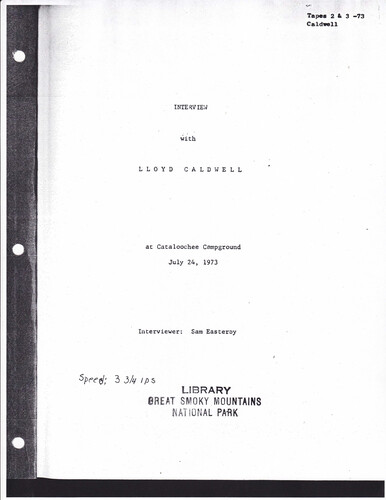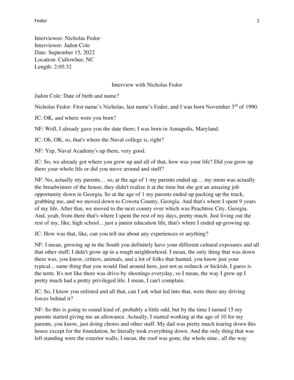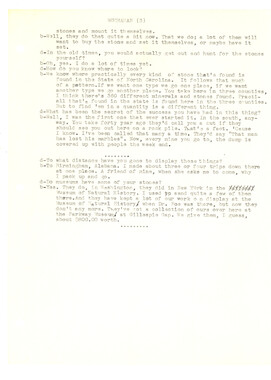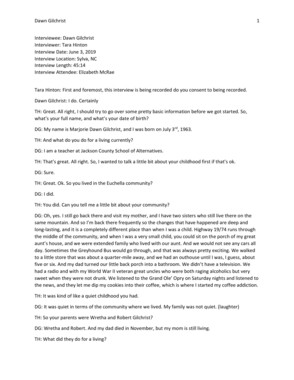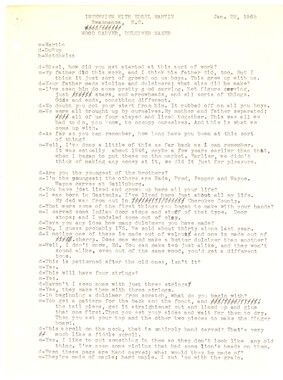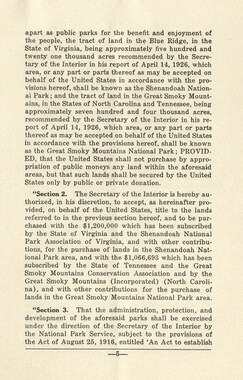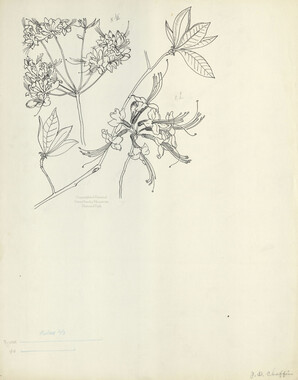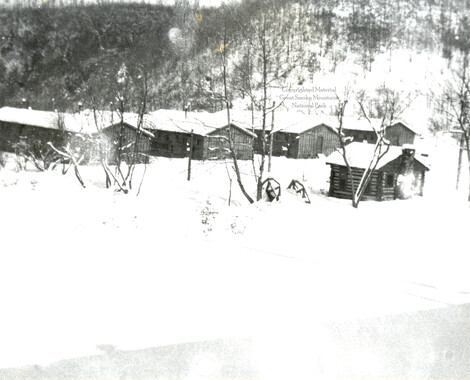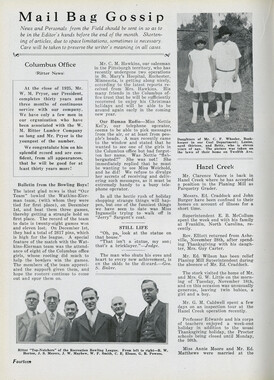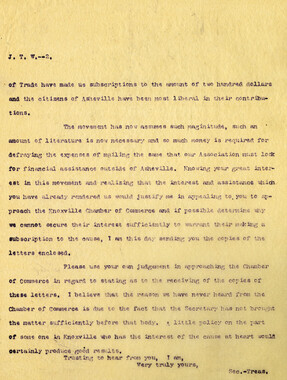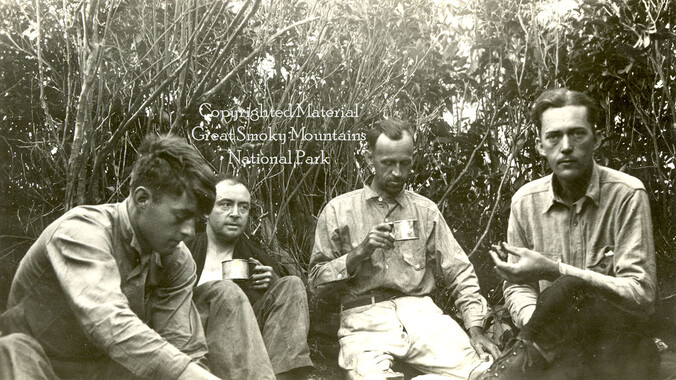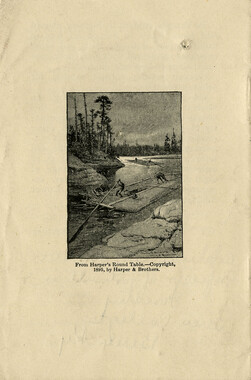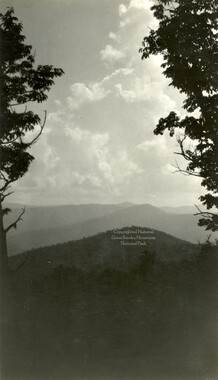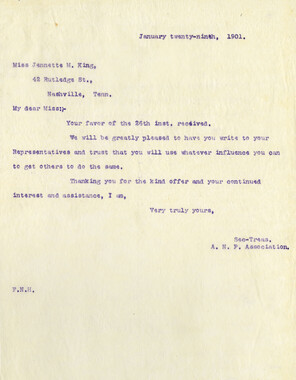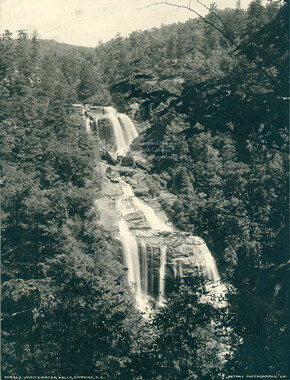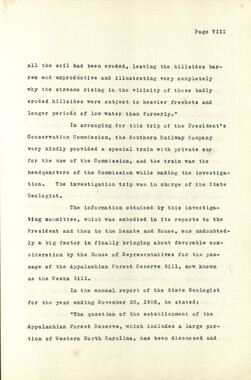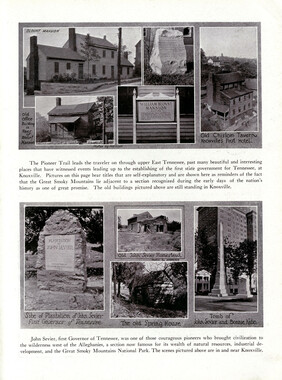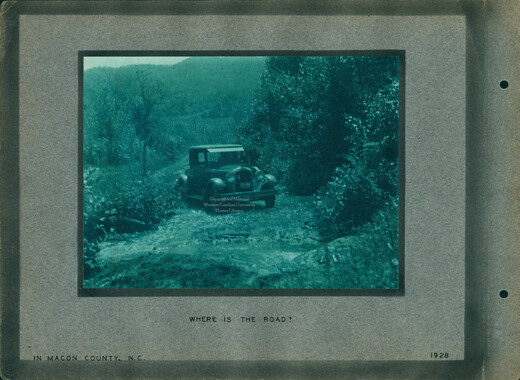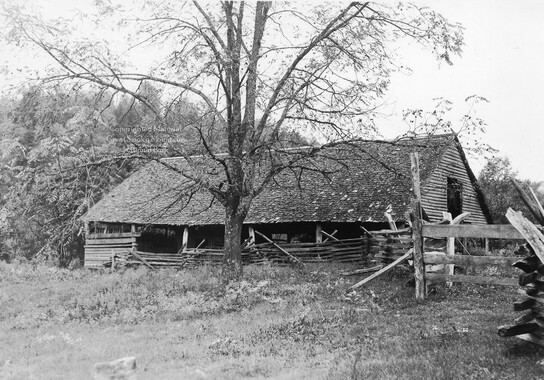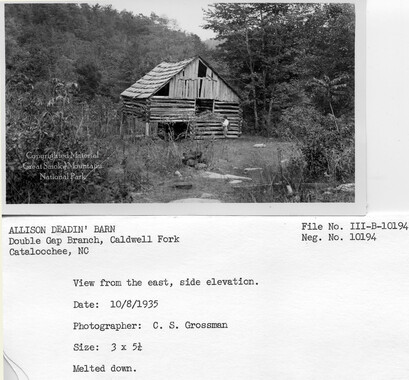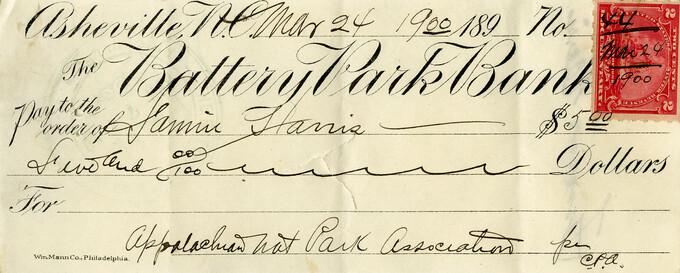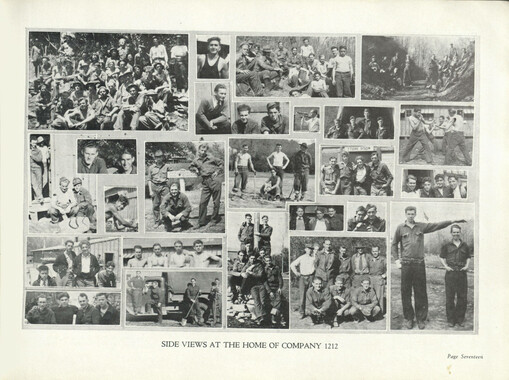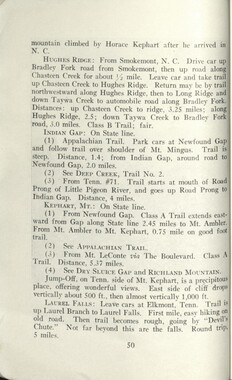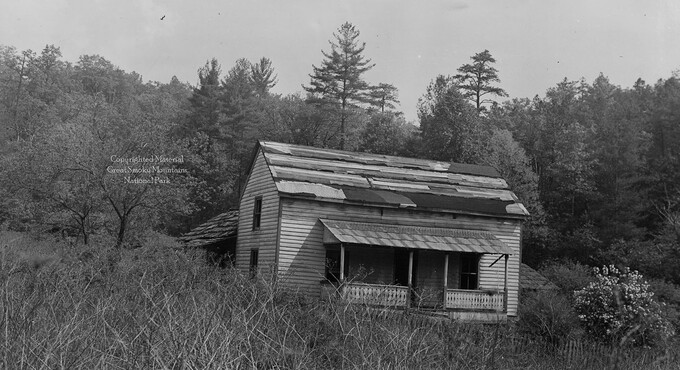Western Carolina University (20)
View all
- Canton Champion Fibre Company (2308)
- Cherokee Traditions (293)
- Civil War in Southern Appalachia (165)
- Craft Revival (1942)
- Great Smoky Mountains - A Park for America (2683)
- Highlights from Western Carolina University (430)
- Horace Kephart (941)
- Journeys Through Jackson (154)
- LGBTQIA+ Archive of Jackson County (7)
- Oral Histories of Western North Carolina (314)
- Picturing Appalachia (6679)
- Stories of Mountain Folk (413)
- Travel Western North Carolina (160)
- Western Carolina University Fine Art Museum Vitreograph Collection (129)
- Western Carolina University Herbarium (92)
- Western Carolina University: Making Memories (708)
- Western Carolina University Publications (2283)
- Western Carolina University Restricted Electronic Theses and Dissertations (146)
- Western North Carolina Regional Maps (71)
- World War II in Southern Appalachia (131)
University of North Carolina Asheville (6)
View all
- Appalachian National Park Association (53)
- Berry, Walter (76)
- Champion Fibre Company (5)
- Fromer, Irving Rhodes, 1913-1994 (70)
- Grant, George Alexander, 1891-1964 (96)
- Kephart, Horace, 1862-1931 (23)
- Masa, George, 1881-1933 (17)
- North Carolina Park Commission (105)
- Roth, Albert, 1890-1974 (142)
- Schenck, Carl Alwin, 1868-1955 (1)
- Stearns, I. K. (2)
- Thompson, James Edward, 1880-1976 (45)
- Weaver, Zebulon, 1872-1948 (55)
- Wilburn, Hiram Coleman, 1880-1967 (72)
- Allanstand Cottage Industries (0)
- Bennett, Kelly, 1890-1974 (0)
- Brasstown Carvers (0)
- Cain, Doreyl Ammons (0)
- Carver, George Washington, 1864?-1943 (0)
- Cathey, Joseph, 1803-1874 (0)
- Champion Paper and Fibre Company (0)
- Cherokee Indian Fair Association (0)
- Cherokee Language Program (0)
- Crittenden, Lorraine (0)
- Crowe, Amanda (0)
- Edmonston, Thomas Benton, 1842-1907 (0)
- Ensley, A. L. (Abraham Lincoln), 1865-1948 (0)
- George Butz (BFS 1907) (0)
- Goodrich, Frances Louisa (0)
- Heard, Marian Gladys (0)
- Kephart, Calvin, 1883-1969 (0)
- Kephart, Laura, 1862-1954 (0)
- Laney, Gideon Thomas, 1889-1976 (0)
- McElhinney, William Julian, 1896-1953 (0)
- Niggli, Josephina, 1910-1983 (0)
- Osborne, Kezia Stradley (0)
- Owens, Samuel Robert, 1918-1995 (0)
- Penland Weavers and Potters (0)
- Rhodes, Judy (0)
- Roberts, Vivienne (0)
- Sherrill's Photography Studio (0)
- Smith, Edward Clark (0)
- Southern Highland Handicraft Guild (0)
- Southern Highlanders, Inc. (0)
- Stalcup, Jesse Bryson (0)
- United States. Indian Arts and Crafts Board (0)
- USFS (0)
- Vance, Zebulon Baird, 1830-1894 (0)
- Western Carolina College (0)
- Western Carolina Teachers College (0)
- Western Carolina University (0)
- Western Carolina University. Mountain Heritage Center (0)
- Whitman, Walt, 1819-1892 (0)
- Williams, Isadora (0)
- 1810s (1)
- 1840s (1)
- 1850s (2)
- 1860s (3)
- 1870s (4)
- 1880s (7)
- 1890s (64)
- 1900s (294)
- 1910s (227)
- 1920s (461)
- 1930s (1501)
- 1940s (82)
- 1950s (15)
- 1960s (13)
- 1970s (47)
- 1980s (14)
- 1990s (17)
- 2000s (31)
- 2010s (1)
- 1600s (0)
- 1700s (0)
- 1800s (0)
- 1820s (0)
- 1830s (0)
- 2020s (0)
- Appalachian Region, Southern (80)
- Asheville (N.C.) (1)
- Avery County (N.C.) (6)
- Blount County (Tenn.) (145)
- Buncombe County (N.C.) (204)
- Cherokee County (N.C.) (10)
- Clay County (N.C.) (3)
- Graham County (N.C.) (108)
- Great Smoky Mountains National Park (N.C. and Tenn.) (416)
- Haywood County (N.C.) (263)
- Henderson County (N.C.) (13)
- Jackson County (N.C.) (58)
- Knox County (Tenn.) (17)
- Knoxville (Tenn.) (8)
- Lake Santeetlah (N.C.) (10)
- Macon County (N.C.) (25)
- Madison County (N.C.) (14)
- McDowell County (N.C.) (5)
- Mitchell County (N.C.) (7)
- Polk County (N.C.) (2)
- Qualla Boundary (22)
- Rutherford County (N.C.) (16)
- Swain County (N.C.) (513)
- Transylvania County (N.C.) (36)
- Watauga County (N.C.) (2)
- Waynesville (N.C.) (2)
- Yancey County (N.C.) (34)
- Aerial Views (3)
- Articles (1)
- Artifacts (object Genre) (4)
- Clippings (information Artifacts) (77)
- Drawings (visual Works) (174)
- Envelopes (2)
- Financial Records (9)
- Fliers (printed Matter) (34)
- Guidebooks (1)
- Interviews (11)
- Land Surveys (102)
- Letters (correspondence) (219)
- Manuscripts (documents) (91)
- Maps (documents) (69)
- Memorandums (14)
- Minutes (administrative Records) (20)
- Negatives (photographs) (198)
- Newsletters (12)
- Paintings (visual Works) (1)
- Pen And Ink Drawings (1)
- Photographs (1657)
- Portraits (23)
- Postcards (15)
- Publications (documents) (107)
- Scrapbooks (3)
- Sound Recordings (7)
- Speeches (documents) (11)
- Transcripts (46)
- Aerial Photographs (0)
- Albums (books) (0)
- Biography (general Genre) (0)
- Cards (information Artifacts) (0)
- Crafts (art Genres) (0)
- Depictions (visual Works) (0)
- Design Drawings (0)
- Facsimiles (reproductions) (0)
- Fiction (general Genre) (0)
- Glass Plate Negatives (0)
- Internegatives (0)
- Newspapers (0)
- Occupation Currency (0)
- Periodicals (0)
- Personal Narratives (0)
- Poetry (0)
- Programs (documents) (0)
- Questionnaires (0)
- Sheet Music (0)
- Slides (photographs) (0)
- Specimens (0)
- Text Messages (0)
- Tintypes (photographs) (0)
- Video Recordings (physical Artifacts) (0)
- Vitreographs (0)
- Appalachian National Park Association Records (336)
- Carlos C. Campbell Collection (198)
- Cataloochee History Project (65)
- George Masa Collection (89)
- Hiram C. Wilburn Papers (28)
- Historic Photographs Collection (236)
- Horace Kephart Collection (126)
- Humbard Collection (33)
- Jim Thompson Collection (44)
- Love Family Papers (11)
- Map Collection (12)
- R.A. Romanes Collection (10)
- Smoky Mountains Hiking Club Collection (616)
- Zebulon Weaver Collection (107)
- A.L. Ensley Collection (0)
- Appalachian Industrial School Records (0)
- Axley-Meroney Collection (0)
- Bayard Wootten Photograph Collection (0)
- Bethel Rural Community Organization Collection (0)
- Blumer Collection (0)
- C.W. Slagle Collection (0)
- Canton Area Historical Museum (0)
- Cherokee Studies Collection (0)
- Daisy Dame Photograph Album (0)
- Daniel Boone VI Collection (0)
- Doris Ulmann Photograph Collection (0)
- Elizabeth H. Lasley Collection (0)
- Elizabeth Woolworth Szold Fleharty Collection (0)
- Frank Fry Collection (0)
- Gideon Laney Collection (0)
- Hazel Scarborough Collection (0)
- Hunter and Weaver Families Collection (0)
- I. D. Blumenthal Collection (0)
- Isadora Williams Collection (0)
- Jesse Bryson Stalcup Collection (0)
- John B. Battle Collection (0)
- John C. Campbell Folk School Records (0)
- John Parris Collection (0)
- Judaculla Rock project (0)
- Kelly Bennett Collection (0)
- Major Wiley Parris Civil War Letters (0)
- McFee-Misemer Civil War Letters (0)
- Mountain Heritage Center Collection (0)
- Norburn - Robertson - Thomson Families Collection (0)
- Pauline Hood Collection (0)
- Pre-Guild Collection (0)
- Qualla Arts and Crafts Mutual Collection (0)
- Rosser H. Taylor Collection (0)
- Samuel Robert Owens Collection (0)
- Sara Madison Collection (0)
- Sherrill Studio Photo Collection (0)
- Stories of Mountain Folk - Radio Programs (0)
- The Reporter, Western Carolina University (0)
- Venoy and Elizabeth Reed Collection (0)
- WCU Gender and Sexuality Oral History Project (0)
- WCU Mountain Heritage Center Oral Histories (0)
- WCU Oral History Collection - Mountain People, Mountain Lives (0)
- WCU Students Newspapers Collection (0)
- Western North Carolina Tomorrow Black Oral History Project (0)
- William Williams Stringfield Collection (0)
- Appalachian Trail (19)
- Church buildings (9)
- Civilian Conservation Corps (U.S.) (91)
- Dams (20)
- Floods (1)
- Forest conservation (11)
- Forests and forestry (42)
- Great Smoky Mountains National Park (N.C. and Tenn.) (64)
- Hunting (2)
- Logging (25)
- Maps (74)
- North Carolina -- Maps (5)
- Postcards (15)
- Railroad trains (8)
- Sports (4)
- Storytelling (2)
- Waterfalls -- Great Smoky Mountains (N.C. and Tenn.) (39)
- African Americans (0)
- Artisans (0)
- Cherokee art (0)
- Cherokee artists -- North Carolina (0)
- Cherokee language (0)
- Cherokee pottery (0)
- Cherokee women (0)
- College student newspapers and periodicals (0)
- Dance (0)
- Education (0)
- Folk music (0)
- Forced removal, 1813-1903 (0)
- Gender nonconformity (0)
- Landscape photography (0)
- Mines and mineral resources (0)
- Paper industry (0)
- Pottery (0)
- Rural electrification -- North Carolina, Western (0)
- School integration -- Southern States (0)
- Segregation -- North Carolina, Western (0)
- Slavery (0)
- Weaving -- Appalachian Region, Southern (0)
- Wood-carving -- Appalachian Region, Southern (0)
- World War, 1939-1945 (0)
- Sound (7)
- StillImage (2088)
- Text (655)
- MovingImage (0)
Interview with Lloyd Caldwell about life in Cataloochee
Item
Item’s are ‘child’ level descriptions to ‘parent’ objects, (e.g. one page of a whole book).
-
-
INTE R.V IE1.~ with L L 0 Y D C A L D W E L L at Cataloochee Campground July 24, 1973 Interviewer: Sam Easterby LIBRARY BREAT SM OKY MOUNTAINS NAT lON AL PAflK Tapes 2 & 3 -73 Caldwell UNITED STATES DEPARTMENT OF THE INTERIOR NATIONAL PARK SERVICE Great Smoky Mountains National Park Gatlinburg, Tennessee 37738 N-o-T- I-C-E No part o.f this -manuscript may be quoted for publication except by written permission of the Superintendent of the Great Smoky · Mountains National Park. 't -'~ KEY ial flush w1th the iefthand margin is that uy Mr. Caldwell. Material indented five spaces 1s that by Mr. Easterby, the interviewer; been transcribed v e r b a t i m e t 1 i t e r a t i m. There editinb whatsoever. t has been made as nearly as possible to put on paper the "flavor" of peech of the speaker. Punctuation has been aimed toward this rather toward proper grarranar. The-comma is used where the speaker paused, the where he stopped. And where there is no punctuation the speaKer went without any pause, oreak, or stopping. as been transcribed on a Wollensak 6020 tape recorder. The counter f1gures /000/ in the body of the text means what was said at that point t understood. The figures (000) in the margin are reference points. GLOSSARY '~ - and - about - can - would had - every - them - before - him - it is it was there is there was n' - and ~J 'n - than onct - once 's - is was th' 's - that was they was there was th'y they that' dbe - that would be thrashin' - threshing wll - well (not a typographical error) whadya - what do you why'n't - why don' t you 7/24/73 INDEX and church War acquisition for the park settlers communities (Fines Creek, White Oak) Roads Working the roads Tall tales Rosin rumo ling Panthers Circuses Cattle grazing Page 1 3 j 6 7 10, 21 13 14 H~, 19 18 20 20, 27 21 22 24 25 26 28 .",-;" : Yeah Page 1 ·J Interview 412. At Cataloochee Campground. July 24, 1973 Interviewer: Tape: ~- 73 !_ t'b'f/ ~~ I '2b or '27 along there an' they still used wagons some after that but it was along that time the road was improved an' th' uh, started ' a little. Now did one person do most -of the trucking or did from over here, it was, they could get hire a truck from the outside. near Waynesville. So until about, from about 1840, to 1926, when North Carolina bought the land It was uh, it was essentially isolated, from the rest of the world. The only way out wafl horseback, or buggy or wagon. Or to walk. Or walk. That's, yeah d1d, to look at this now look at all the people in the campground, that you can drive in, in an hour, or an hour and a half from Asheville, from Asheville even, much less from Waynesville Yeah you can drive from Asheville you can, make it over here in, around an hour. And to think, how long would it take to, to say go to i~aynesvi lle in the 20s '! Well it was uh they usually took 'em two days. One day to \~aynesville an' they spend the night an' back th' next day. 11 7/24/73 say "they" who were most of the people that went out'{ every family had one person that would go out or did one man and bring in supplies for family went an' sometimes maybe be two three of 'em go together, ·· 'n' sometimes just one, one person take the wagon out of the family, go to · Waynesville. Was it kinda did they ever have ktnd of a wagon train·; Occasionally, they maybe be, half a dozen of 'em, that would go all together. But during my boyhood days uh, the most of it was done just maybe one or two .) families. I can remember my facher gotn' 'n', when I was a boy the first trip I'd ever remember bein' out through Cove Creek Gap we went in a wagon. Huh. Course it was a few trucks then we went, over to Cove Creek. An' spent th' night. An' the next morning uh, the man had a truck, an' we went on to Waynesville, an' picked up what supplies they 's gonna get, brought 'em back there that was abaut th' halfway mark, an' loaded 'em on Lhe wa&on, rest of the day comin' in back here. What did you take with you when you went to Waynesville ·; Well they usually didn't have anything except maybe, a L ·ttle food wh.1.ch would be f.1.xed up at home. , ... ,_ ,, "----'·- ·1 ~;; ' •. '"""~-··--- ··-···- Didn't have any instant strawberries or anything like that? If they did they had it camouflaged. Uh. You know a couple of Jt ·· · ·'-:~-~~-r · t A.fo4b'"" · ..~ Now ordinarily was strictly business they they went, there and back, as, within reasonable length of time. Hrnm. Now the other day we were talking about the church. Well I guess it was a good while back we were talkin' about the church down here y'know. An' I got to thinking about that, and wondering, if, if Cataloochee was particular, as a mountain community, if it had its own, it wasn't just a mountain community it was Cataloochee. That,that the people probably had their own, their own sense of religion too, An', that, there were special things about religion to them that maybe weren't to other mountain peoplE! there. They only had (Double) Church meant a lot to 'em. To th' majority of the people. An' th' majority of 'em attended Sunday school an' church, But, when I was a growin' up, they had Sunday school ever' Sunday, See this was a Methodist church 'n' you know a little about th' Methodist. Uh one minister would have so many charges. o) (Double) This this church up here had regular services 'bout onct a month. He'd come in where would he stay ·: Well he'd he'd spend th' night with somebody in th' community. Did he did that chance? Did he circulate around? ) "caldwell 7/24/73 Page 4 be circulated around different ones. Did the did the people generally gather around the place where he was? Or more or less would meet 'im at th', at th' church it was a-- Usually, Sundays an' when th', they called it preachin' day back in the olden An' they'd always gather before seniice an' that's when they'd do of their visitin' before, regular church hours. An' he he'd probably bring in a lot of news too w.ouldn't he'? Uh huh. Huh. So that was quite a festival then. Is that where dinner on the ground came when you'd take your meal co the church or Occasionally they'd have those. Then just everybody 'd fix something up 'n' Yeah. Uh huh. Somethin' similar to what they have homecoming day. An' then usually, that'dbe in usually in the fall of th' year they'd have uh, about a week or ten days. of a revival meet. An' they done somechin' then in th' old days that they don't do now. Now I can rememt>er when I was a school boy goin' to school just a little fellow, you know you know where the schoolhouse is now '! Uh huh. Was that where you went to school'? Yeah. I saw 'em many a time that, they'd have services durin' the day at about eleven o'clock, ~11 the teachers they had two teachers, each teacher get their group out, an' line 'em up, an' down the road to the church house. Now you tell me a school this day 'n' time ~ake 'em to church. That's something. ~J ell did, did the families, y'know as a unit as one family unit, spend a lot of time talking about religion·: •• • ' ;:-:~::< • • :":-.~ ~-r';: : }{ •· , ,. ;:-·~ "" //'1.4/lJ ~"'~11' ' ·~ -~· ...... ? .,. ~::~~-~.,., .. -~, '~ . :·.~ ,.~1!:7~:;=-:1!;~"'· .. ~ -" ... e-; ~r~; _, ~- ' , : · :Page 5 Not too much. Th' 's. They, they believed in their church, an' uh thing, but, most of their visitin' was you know, just ordinaril~ crops, stock, cattle 'n' things like that. so it, so religion was probably a pretty personal thing to 'em then was personal. Now who was I guess ~t was Sam Sutton, who told us that, that a lot of times you'd go down to the church around to the church and, the menfolk would be outside, sittin' around talking, and what few men th' when you . went inside, that the women 'd sit on one side and the men would sit on the other • . Now I've been told that 'n' it undoubtedly must be true but I can't remember it myself. That, th' ladies would sit on one side, an' the men on the other. I think that's pretty well true. Does that say anything about the courting up here? What was that like? Oh that that went on too, just like it does today only it 's a different style. How was that '! Wll if they, they went to the house they usually, all, just had one big living room and that's where they done their court1ng. Course, sometimes in the later years, 'n' he's lucky nuf to have a horse 'n' buggy go uuggy riding, horseback riding. Huh. An' that was it, not like chis day 'n' time youJ you take your girl to Asheville or, maybe )0 miles away. But during them days if they got five miles away they was a long ways from home. . -~::~{:~~~~-r~~ -~~·~.~, 11 ? 7/24/73 . ' .. . "<:::i' - P~ge 6 chaperoned, pretty well by the parents ·:' th' time. Except when you could sneak five miles away. Right? you like some of this { believe I do I had, not too long since I ate supper. just something fascinating about the way people lived up here. - An' the way they you know they carried on. It seems that throughout that that whole period, an' course I I haven't heard much about say from 18--, 1830 to you know to 1900. But it seems that from what time an' what little bit I have heard about that "''hole period that: there, most of the people lived pretty close to the land that they were, they developed kind of an environment awareness. They did, so accordin' to what's been handed down to me. What do you know about those early days ·? Just what have you been told about that·t Well over the years I'd hadn't never thought much about it. Few of the things come back to me that was handed down to me I can remember uh, hearin' the old one tell about one time they had a, a thrashin' machine in here, done their own thrashin 1 they raised some wheat. That was-- Uh. The power generated on something SLmilar to a, a cane mill with a horse. Huh. But the best I remember~ that, then they had to take th' wheat, an' then some kind of a rig they had an' get this chaff out. Kinda like like th' thrashin' mach1ne have have now thaL would Do everythin&. Huh. When was that'! Do you know when they had that in here 't remember seein' th' p1eces of th', of ch', settin' under an old th', at th' old Andy Caldwell barn. That's on Rough Fork. I'd back in th' late 1~-- uh aroun' 1890, somewheres in that th' Civil War. What stories have you been told about the Civil War up here ·z Ah don't remember. Right off. I don't remember too many things uh that about except uh, I've heard 'em tell lot of times about, that uh, outlaw or Kirks men or ever what they 's supposed to have been that came through here. There wasn't much fighting up here though was there! No, not in this area there. Th', what I can remember bein' told they was just a group of outlaws they did come through here, an' it was two killed on Caldwell Fork. Well (Double) What I can remember of be in' told, that these two people that was killed, was uh, kinda dodbin' out they didn't, want, nothin' in it. Uh huh. An' I've also remember tell1n' about th', th', what uh, see the most of th' men of age was already in th' Confederate army, an' it wasn't many a~le bod1ed men in here. .,~_ -<.' ,,_. , ... -"T, , - , say th' this group come alon& an• they found a horse, at a, at a just take it. An 1 I also have been told that they had to keep. cows like that htd out. Or if they had meat you know like they days they 1d just take it. In other words anything they Just kwda like a band of rebels huh '? Which, kinda what they were huh'! Did anybody fight for the Union? Anything? Who were, who were the two uh for sure but I think uh, it was a few of •em in here that, that on here after that. That was in the Union army. But I don 1 t remember, they was in it by chotce or whether, or how it was. Well who were the two brothers that, that came back after the Civil War and one had fought for the South an• one had fought for the North an•, they lived across the creek from each other? was on Rough Fork. That was Harrison Caldwell an• I 1m not for sure but his brother name was Andy an• I believe one was in the Confederate an• in th', in the Union. Now I believe that•s right but I 1m not for sure. You remember hearing anythin~ about them though about not (Double) What: they were like'? My growin 1 up days. Who was your favorite person doliO here, when you were growing up'? .Well you know how a boy l.S usually his father. Tell me about him. , Pa_ge · 9 kinda hard to explain. Seein' all the work they could do an' how handle a team, how they could mount a horse 'n', handle stock. along like that. Did you want to did you want to do that when you got older·? At at that time, wasn't like it is today you didn't think only horses or, or a good farm, wagon, team, things along You remember did did you know your grandfather? remember my grandfather. hearing anything about him or huh. On my father's side. Uh. His daddy 'n' mother both they died he was young, just a small kid. An' they was raised up by their An' other my grandfather's family raised 'em an' their mother some with their moLher's family, an' some with their on my father side. How many how many uh, how many children were in your in your dad's family, I don't mean in yours but was in your grandfather's on your dad's side? How many uncles do you have aunts and uncles. That's the way it is. one aunt on my father's side. An' three uncles. What • s all what's all this intermarriage talK! Did they did they Intermarry a lot ·z Here? Yeah. Do\JJ 11 +' ~ew~ second cousins or something like that. ;~ didn't go any, you didn't have uh firsc cousins and things like think so. tell me one time that, that, there were more people that came in here than moved out '? during my boyhood. days now a lot of the younger gen- uh was grow in 1 up, my father's age. Now they 's a lot of them moved out. See in on his side, he 's the only one that stayed·rest of 'em moved Where did they got Did they just buy some land somewhere else an' just More or less do the same kind of work'! of them farmed 'n', an' uh one uncle moved to Waynesville. An' followed We 11 he came didn t t you te 11 me he came back in here 'l Didn 1 t you have a relative that worked on this uh dam up here? . that I remember at: the dam. Now I've I've got two uncles a livin', :t:R. 011 D v N-one lives at ~o/aynesville an' one in the /157/ that was raised here. That's not Glenn Palmer is it'! Is he an uncle of yours·: No cousin. Now himJGle:nn an' my father was first cousins. How is he doin', I haven't last I heard he's doin' fairly well. Now Glenn's gcttin' up, he's up in 80. Is he? Huh. Oh Sam Sutton was in his 80s, wasn't he? He he 's close to it. Somebody some body told me he was 92 years old. ·~i]ir ',}Pi,"iffir'1"'""''"';;:o' .,,, o' !:< " •' '':""" "' • "I - ·· r t '_, :,rrage J.J. tellin' my sister the other day about, uh, you'd been back over said you'd be had been to see Sam 'n' an' I told her I sez "I 's that told him where he lived." An' she she 's tellin' about the, tha+ had brought you down there '! Uh huh. now I believe I tol' her then that you'd you'd met his girl at school. Uh huh. come you to know him. Now how how did she find out that Hylce took us ov~r there: They go to churGh up there. Do they! I believe the way now she found it out. An' she visits, went to over to see Sam a whole lot. Oh. (Double) So she knows They live right there they live right there near by. See that's whereNettie moved to (Double) That's your sister f Over to Jonathans Creek right near where Sam lived. An' Nettie 's your sister? No that was my sister that was at horne. Now wait a minute. Hho 1 s Nettie : Who? Nettie. that is that what you're talkin' about? about my sister. They live on up on the hi ll above where she the one I think you're talkin' about. Aunt Addie lives right r the highway. ways up th' road there where you turn out, up went out to know something we haven't talked to one one lady that lived in lives right, just a little ways down the highway, you turn off on where you turn to Sam, an' she was raised on Caldwell Fork. sometime ·~'talk to her. her name '? uh that's your aunt '£ that's my aunt. Well do was your sister ra1sed up here ~ was uh pretty good sized, girl when we left here. She 's close to 50 I guess. When did you all move out of here ·t , :I think it was '36. So you were in here well into the time that the park was here then? Oh yeah. I remember all about it. that like what was what was life under under the park'? Like? bad. Except that, before the people sold, you know 1 th' property belonged to 'em an' they could do whatever they it. But, they soon learned after it was sold, that it was more authority over it. But as a whole th' they was treated, good. ife wasn't that much different? they just gradually started movin' out, they. didn't didn't like So most of the people that lived here were given lifetime They just leased by the year. Tennessee, th·~Y had a different law over there. 1 N' th' s some of 'em, ink th' way they bought it, some of th' old settlers they give 'em a time lease on it. Uh huh. then they, in that way, they couldn't put 'em out as long as they lived. Uh huh. North Carolina done different. Just did it on a yearly basis? If I remember right it was, leased it each year. \Vho stood the best when when everybody moved out '? Who how? r ' Jonathan Woody cleaned up, in in sellin 1 his land an' he moved out. He made a lot of money off of it. Let me think a minute. Now some of 'em did get better prices that was their own good luck by havin' sense enough to know Them that~ jumped to conclusion quick an' sold quick was the one it gettin' cheated. They just let them land buyers out talk 'em, 'em. one way I guess that was business. in another way they got cheated. what it. really boiled down to. Huh. There wasn't any organized effort to stop'em? They uh, if they had it would've been hard to get. Uh huh. in this day 'n' time, that it'd be hard to buy up a whole community did then. Now some of 'em carried it to went on to the courts it. I think that's what Wood-Woody di d. don't remember now he may have now, Mark Hannah's folks, his home place I ~ think it went to court. Now is that Ended up a gettin• more money. Is that the one up the road by the cemetery or is that Yeah. Uh huh. On Little Cata looch. Now who mentioned, J. A. was Mark's father eh'! .>j .~ · ._,<"'" J. A. I believe that was the old man Jim 1 one where th', th' log buildin' that's got the tarpaper roof on th' park keeps covered·i That's where he lived. that's his grandfather it would've been his uncle. ' then an' then Mack Hannah's place is up the road by the cemetery? right. one that's al• almost down now? that most of the records over there give give ~~rk Hannah credit for this one that's standing ~he one with the tarpaper roof. probably did have a lot, to do with I mean, gettin' 'em to keep it pretty good cabin too isn't it? like I've heard him say that that's where his 5randfather lived. But about that. Who was Ivan Hannah? Now I've read that he was one of the first fellows that came in here. You know he's buried up there in the in th' Little Cataloochee uh (Double) You're sure the Little Cat- May be Hannah cemetery. It may be in the Hannahs. ''-.,./ i . 'i' ·:-~ - .· I think it is. l-fcc;Lq _ · - Now it 1 s another cemetery, up near Hog-an -Gap. a tom~stone that's one you should go co. An' tha', it's one there ·but. I can't think whether his first name was Evan or tombstone there, on two or three of the graves, an' they're is that,. where is ~k~){? Gap'! Has it got the same name on the map? would be uh is where th' new road goes through, where it ends But to get to t~ac cemetery th', go up th' new road you come to the road. left: like you come come back down the old road? Turn left goin• to Cosby? two or three hundred yards you cross a branch, an' you'll you'll see to an old roadway turns to th' right 'n' you just follow that up an' you'll come to it. It's about half a mile up there to it. So it's not~ it's not up the uh, where the gate is? It's on down th' If you knew if you knew how to go when you got up there to th 1 end of th' - road, you could come to it. But if if I go down, I turn left goin' to Cosby. Yeah. a little way a hundred yard way. You get down to the foot of the hill an' you cross th' you'll see a open way goes up to an old growed up field. it's what is it th' top of the hili or'£ all th' way to th' top, uut if you just follow that old it'll bring you right out to i~. Now when when you get up to it on your left. An', it has had a w1re fence ar·ound it at one time, you just followed the old who I haven't heard anything a0out that cemetery. That that's An' there's one of the older ones one of th' oldest ones over here. got dates an' everything on 1t? , two or three of th' graves it's got tomustone added. Oh they were added after, they weren't made at th' time or know. Now they could have oeen put on there, shortly th' grave, was put there. An' then they could 've been years I don't -Are there any more cemeteries like that '? it's several little small cemeteries over here 'n' there's END of SIDE 1 at 242 BREAK 's an old gentleman lives ac. Waynesv1lle wrote two or three books, old timer. Old man Clark Nedford. Now he's wricten a bunch on Haywood County. read several I can't think of th' names of 'em right now but. can remember th' thing that he wrote aoout .bY George he, he Well whadya what do you remember have have you been, told anything of the f1.rst people that came in'! Came in to Cataloochee'l of the Caldwells were, were some of the first ones weren't grandfac.her was one of th' f.Lrst settlers in here an' th', an' th' Hannahs. was your greac grandfac.her's name. Right. Levi Caldwell. I couldn't remember that. th' Palmers old man, Jesse Palmer, wh1ch would be th' great Now he 's one he, he had a brother Lafayette. Now that was father down, here at th' where ch' old ranger station is now. So Jarvis and Lafayette were broLhers. Jarvis is Lafayetc.e's son. Oh but buL the, the first Palmer that came in was Jarv1.st 'f/~~~~f~~~~-' -,: ;~- ~ /24/73 their father of Fate an' Jesse I believe their father was the first one? that, what I can remember bein' told that, that my great Face, now that's what he always went, by you know th' people didn't call him "Lafayette~ they just said "Fate." That undoubtedly been grown, just about grown when they moved here. And that was with their, wtth their father? with him. he married a Caldwell. A sister to my grandfather. An' Jesse , which would've been Sheriff Palmer's father Turkey George. Creek Georbe oh yeah. Creek George that was, Lafayette was his father he 's brother to Jarvis. a Rogers I believe, I've heard my daddy tell. Where did the Rogers come from? believe from th' Fines Creek area. You know where Fines Creek Uh huh. the fLrst exit after you hit I-40 over yonder now: that another l.t.ttle connnunity over there too: Greek 's a b.t.g community. But, at that time it was uh, thac's of 'em traveled 1n th' olden days see you could ride a horse {4o<Jie'1) HGgaa Cap where we was talkin' about that cemetery? the 1.Jhi~.:e OaK connnunity an 1 come out at the mout:h of Fines Oak a precty big place too1 It just, when you. At the end of the new road when you you're on the WhiLe Oak side. In ocher words when th' rest of 's finished it will go righc around through th' White Oak community. in at th' mouth of Fines GreeK. Is there is there anyt:hmg there at White Oak now? Or ' only just, a farmin' class people. Some of 'em worKs in faccory of 'em JUSt small farms. Mouncain farms. it it: wasn't che same kind of community thac Gataloochee was though it? See this gets bacK to what we were talKing about a while ago char. the uh ic wasn't as isolaLed as much as it was over here was nearer, to 'n' r::h', 'n' Fines GreeK was a, big community 'n' see chey was across th' river from Fines GreeK. \~o built who built 284 Lnto here? Well who built that: road throu0h the mounta1ns to daynesvLlle i to what I've read, that old road was built, way back ·in , probably r~ght after the Civil War. uh, th.e Cataloochee Turnp1ke or, and they had a, it was a toll t I've read. I believe it tells that in All~'s book. Yeah Wh- or Medford one one of the two. lark Medford's book I bel~eve it mentions in both of 'em. And th' I rs tryin' to think whether th' county or, it was improved But in the early days th' th' state didn't, didn't keep these like they do now. They had a the county had a road tax. An' I can here, you could either pay that tax, or put in so many days workin' road. Remember seein' 'em working. did most of the people dot Did they pay the tax? of 'em some of •em 'd pay it an' some of 'ern, go out an' help 'e~ the crew work four or five days on the road. Was that mostly just moving rocks or was that building new roads or anything they wanted or it was mostly it was just improvin' the roadway chat: was there. Grading an' ' it up. Huh Wll wh- what about people like like Sam Sutton d~d they have to uh, to pay that tax or or go out? I think he would've been exempted. didn't you tell me last week that he uh, arouro with a lot of the people that, for the most part'! just lived with his people for years an' years. On up til he he married when he was about what SO or 60 or so;l 's way up in his late 40s 50 somewheres along there. Maybe up I don't remember exactly, it was shortly before 1-lorld War Two. he was married about 3S years something like wasn't he? married a long time. Yeah. That's longer than most people ·· t 1 s longer 'n some of 1 ern lives together now. Right. Did your folks get into tellin 1 you a lot of ghost stories an' things like like that up in here, a lot of, did they make up a lot of fables, an' yeah they usually had some of them a go1n 1 • Wh- .do you remember any of 'ern! Oh you told me you were gain' to tell me some tall ones tonight. 11 I can tell you one one that I saw one night. What was tha t't tell you what it was. A-right. ' that was at Palmer Creek. I, I was cornin' down there one night just An', it's just above the old mill what they call the mill An', I looked down th' road an' I .could see a object cornin' through air just about as high as your head. An' if I hadn't a found out what that 'r,•_!,.·J ,.,.,., would've been 'nother one of your So I j'ust · stopped.- ' get out of the road, the bank was too high to go up the bank 'n' th' bank I'd a went into th' creek. An' I didn't see what it wall(ed right up to me. An' it was a man a carryin' a barrel, see the man but that's what I could see comin' through th' air. his barrel down, we had a little chat, he loaded his barrel up went the road an' I went on home. Who was iti no name. (Laughing) Well tell me what was in th' barrel then. barrel was empty. been full he couldn't a carried it. He goin' up to get some uh That sounds like a joke but now that's th' truth. No I belleve you. (Laughing) An' so you won't tell me what he was go in' to do huh'? Or who he was let you guess at that. Oh. I I think I can. He had something goin' up th' road. That must must be somebody that uh that's been about 40 years ago. 's a lot of people l~ved up here then. Hmm. .-.. '"' 7/24/73 Page that's the way a lot of your ghost stories get started. he'd he'd seen you runnin' he'd a probably run an' you'd both a story to tell. a both had a tale. Hmm. I guess that, that would he a sight to see. Just somethin' you in the air like that, especially a barrel. If you didn't it was. uncle pulled a joke on me one time. Ah. I wen~, high school 'n' to board out uh if you went any farther 'n the 7th grade. An' with my uncle, an' I went to school at Clyde. So while I was 1 one day they made it up. My uncle was a workin' away from home , another uncle that lived down below. An', that ntght it wasn't there bu.t. my aunt, an' her sister 'n' me, so they'd made it up during t.he.'1 After dark slipped up to the house an' . fixed up, I don't know \V nqf f Ju'f u 5 1"'1, you ever heard it but it seems rosin &"'t to use, had to make it just They'd told a few ghost stories an' scary tales, an' I heard maneuvered me aroun' an' got me sittin' in a chair with to a window. An 1 I heard some thin' it was a weather boarded house an' some thin' like sore.ething climb in' th' wall outside. I looked aroun' that was htrn getttn' his nail fastened under that to fasten his string to. An' they take that, English rosin cord, hold it tight an' pull it back 'n' forth 'n' it'll d about halfway between a fiddle an' a cat a squallin'. An' I made one an' I went cleared, about halfway acros~ th' room. An' thy these women Page 25 . ike they th' 's scared 'n' I didn't catch it. They 's laughing at 1 tried to get me to go, to get my uncle to come up there. Told 'em ' doin'! An' there 's where I learned another lesson, he was peepin' th' window at me. An' his hat brim touched th' window when he did I An' just suddenly dawned on me what it was. Now he he just took a, nail an' tied a string to it. then slip that nail up under th' edge of th' weatherboardin' til pull ~.:h' string o& a piece of cord tight. Now- it' 11 make a noise. It sounds out throubh th' wood. (Laughing) Ugh. 'N' you jusL get a clunk of rosin. you c'n sorta peck it or just, pull it slow an' it'll just sound like Ha ha. Well speaking of cats did they have did they you hear anything about panthers up here~ more than, panther tale ever' once in a while but I ne'.S:' saw Now in th' early days back in the 1800 th' 's no douot what they in here. Now when when the folks were talkin' about panthers d1d Lhey mean the black panther '! they was an old tone~ tawny ltke color. Uh huh. an old yellow house cat or something like Just a big mountain ·lion huh But they they had a, a long tail. to see a picture of that. Wll well it was black? Was he th' paper it was just as black as a, as charcoal. An' chey sent it to Knoxville an' that's actually what it was a black couldn't figure out how come it in that area I was over here th' Cosby campground in Cosoy community somewheres there. Well somebody found it an 1 took it up to the ranger 1 s house. Put in on the doorstep or somethin 1 • Evidently a pack of dogs got it. So that means th' that's that's odd that there would be a black panther up 'cause they're mostly from uh, from uh India an' places like ·that unless ) it undoubtedly must've got out of a zoo or Circus or somethin' loose circus or s~animal carnLval passin 1 through they . ~ J.oose. Yeah. Now is that somethin' thac you all had up here did you have any clrcuses comin' throu<,h or travel. in' shows; they used to circuses used to c..:ome to . Jay- Waynesville, small ones. An' I c 1n remember I never did get to go co iL but I c'n oein' in Asheville. Asheville was at; Haynesvtlle. That's after, 'bout grown. ways away then wasn't it1 s .that a two-day times bigger 'n it was first time I can rememoer bein' in all different. Ah see over here aroun' Haynesville all those now, r.h', where 276 is now that was, was old 284. An' was a more or less followed the way the creek Jonathan Creek runs up there, tll you got to Dellwood. Uh huh. ' it was paved from ~here to Waynesville. Hmm. 1.:0 \vaynesville. · Bu.: it, it's been regraded an' it's different: where the th' road is now. On out there at where th' road turns to ville, uh, was still 284. An' then see the road goes on through now Junaluksa 'n' it wasn't any road there to go to Asheville you had, to go to Waynesville, an' then back by Lake Junaluska. An' through lyde, Canton~ th' road was crooked, but 1t was a paved road all the way from Waynesville to Asheville. When I was I 's a boy. Well then 284 was the only way through the mountains then wasn't it, except to go up around Hot Springs an' That's th' only way into Tennessee except go down 20Y, an' uh Hot Springs, Spring Creek, got down in th' Crabtree section chat road was just as crooked 'bouc as it was through here. was pretty isolated too wasn't it? It wasn't as isolated as near l1ke it was over here. what about some of the communities over 1n Madison County. never was, familiar with Mad1son County but. I guess Hot Springs little small, it it wouldn't have been a town then I don't 'N' just a little village, town of any size would've been Asheville. Or Newport. was always kind of a resort too eh. They had these m1neral an' So that just hoes to show thac Cataloochee is, still holds up. Lhey was just, farmin', stock, Most of the money came from stock·t ir their ~lear money came from stock, cattle, sheep, hoLs. Was there a lot did they have a lot of sheep up here ·: How did th' people feel about grazing the two together'? Page 2~ I don't remember of hav1ng any conflicts over it. See it uh, at th', th' they just turned their stock out. I can remember when seein', cows, hogs, geese, an', sheep out in th' roads. They , had to had to fence th' crops that's why you see so many fence rails today. didn't fence in the an1mals they fenced in th' crops? just turned th', turned the1r stock outside, 'n' th' hogs run in th' See at tQat ti; :.e it was uh chestnut:. Now they didn't let the cattle feed on the chestnuts chough ttle didn't eat it much. Now hogs would. I heard chat, uh chestnuts a cow eating chestnuts would make it sicK or turn ~he milK sour or something. 't know whether it bothered th' milk or noL but it wouldn't a hurt the Now it was a weed about cwo or three different kinds, if their milK that weed you couldn't, you couldn't eat th' butter or dr1nk th' it wouldn't hurt you my goodness what a taste 1t: would have. Well what kind of weed was that? 1' what th 1 name of th 1 weed but do remember one of 'em. It's bad an' that was ramps. You let a milk cow get a mess of ramps an~ 1 lt 1d be three Or four days 'fore you COUld USe th' milK til them rampS t out of her system. Oh. That 1 s funny. But it was all r1ght to drlnK lL was just that ''' t had a cerrible taste to it huh. you got a taste of it you wouldn 1 t drink no more of it. ,. Kinda fouled things up. kind of weed you could even smell the milk. That's something. What did they use for herbs an', not herbs but kind of herbs did they use for medicines an' things like that up Did they still do that around, around the uh 30s an', the 20s? I was a small boy I can remember 'em makin' uh teas outa, spicewood spicewood. do that? Just boil it 'l An• some of 'em 'd use uh sassafras, make a tea out of it. Was there a lot of wild sassa~ras up here or, did they grow their own or what wild. That's that"s reaLly something. Looks like they've given up over there. I guess Ird better go pretty soon 'cause it gets so dark after a can't find my car. Well you want to take one of my flashlithts can see to get over there yet. got two of 'em in here. One of 'em the bac:teries about Which one 's brighter! Let's see. we got to talkin' here it's later 'n I thought it was. What time a guess. Ten of ten. better go. Well we've been gain 1 at it for a while. END at 224 i•em Imlen elllltt!IW UIMiiiU 289 1!1 iha .... of tae iape thc:e JMCa naewliiR8 8wli iii i& sa wtwfihli Q& to he indi&tinguisbiihle.
Object
Object’s are ‘parent’ level descriptions to ‘children’ items, (e.g. a book with pages).
-
This 111-page manuscript is a series of three “Interview(s) with Lloyd Caldwell.” The 1973 interview recalls life in Cataloochee with a focus on cemeteries and homesteads. The history was collected as part of the Cataloochee History Project that collected photographs, stories, and oral histories about families who lived in the Cataloochee Valley. Today’s Cataloochee Valley is within the Great Smoky Mountains National Park. While, in general, the Great Smoky Mountains region was sparsely populated, the Cataloochee Valley remained an exception. By 1900, the population of Cataloochee had grown to 1,000 residents living in hundreds of log and frame homes.
-
